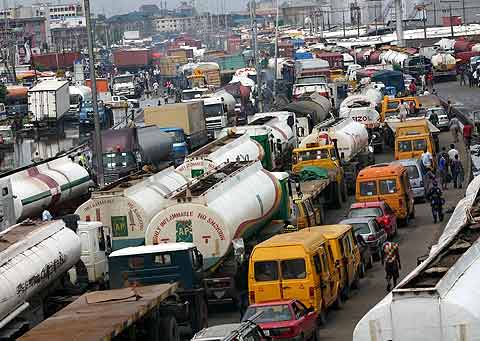
At the 2018 Third Quarter Town Hall meeting held at the Community Primary School, Iberekodo in Ibeju-Lekki Local Council Development area of Lagos State, Governor Akinwunmi Ambode expressed the helplessness of his government over the protracted chaos in Apapa. He also made an important call that should serve as counsel to the Federal Government. He captured the issues unambiguously saying, “It is pathetic that gridlock in the axis (Apapa) has become perennial in the state; it goes and comes. But the challenge is to give a permanent solution. It is a national issue and must be addressed as same immediately. Also, we do not need tank farms within Lagos metropolis anymore. There are 68 tank farms in Apapa alone; that is a serious danger waiting to happen.”
The Governor raised some fundamental issues in his comment; however it is important to take them holistically and not in isolation. It is sad enough that Nigeria allows businessmen to build tank farms in a densely populated area like Apapa. It is even more worrisome that the government would extend the same absurdity to a more populated area like Ijegun.
The points raised by the Governor are not novel; they are the same issues stakeholders have lamented about for years. Perhaps now that a notable political office holder has reiterated what many have said repeatedly, the Federal Government would pay attention and do the needful. The three main factors behind the excruciating experience in the metropolis are the uncontrolled upsurge of tank farms, the dilapidated port roads, and lack of functional truck parks. These issues are further compounded by the absence of a functional rail system for the transportation of cargoes to and fro the ports; hence the reliance on road transportation for movement of goods.
The preponderance of tank farms and the absence of functional truck parks presuppose that reconstruction and expansion of roads in the area may not be a lasting solution to the Apapa debacle. Therefore, in addressing the harrowing gridlock, the government must consider a multipronged approach, which must take into consideration the relocation of tank farms and the construction of modern truck parks.
Governor Ambode has done well by making a call that is for the greater good. However, we call on the Governor to go beyond making a public call and start an advocacy that will resonate with other political office holders and compel the Federal Government to act fast and act right. The ports in Lagos possess the capacity to do more if government addresses these protracted challenges holistically, other than the piecemeal approach that is being deployed. The people of Lagos have suffered unduly due to the deplorable situation of roads in Apapa, and the consequences of the chaotic state of affairs. The unidentified fact is that the government will actually make more money when the issues at stake are holistically addressed. Essentially, the government needs to change its approach to the development and management of cities and communities with seaports in the country. The traffic gridlock in Apapa is a typical example of what obtains in other parts of the country with ports that are even hardly functional.
Ultimately, the lasting solution to this frustrating situation in Apapa is for the government to reassess the design of the Apapa metropolis. Tank farms have no business in the area, and it is an anomaly to have a port with no functional truck parks nearby. Nevertheless, whilst Governor Ambode is commended for speaking to the issues, it is important for the state government to respond more responsibly. The inner roads and adjoining drainages in Apapa also deserve the attention of the state government. This intervention does not require the involvement of the federal government. The quality of inner roads in the metropolis can either aid or hinder traffic flow.
Copyright Ships & Ports Ltd. Permission to use quotations from this article is granted subject to appropriate credit given to www.shipsandports.com.ng as the source.